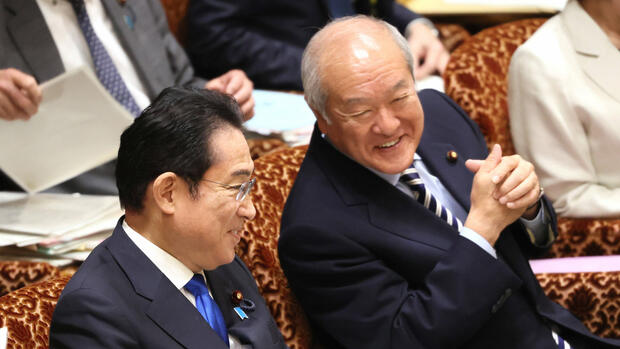Tokyo Japanese Prime Minister Fumio Kishida has promised a lot of money first to the military and now to families. After doubling the armaments budget, he announced in mid-June that the education budget would also be doubled. The additional expenditure amounts to around 40 billion euros per year.
However, it is unclear how the government intends to avoid a debt crisis in view of these new spending. Japan is already the most indebted industrialized country in the world. Debt is around 250 percent of gross domestic product (GDP).
Originally, Kishida brought tax increases into play. But his Liberal Democratic Party (LDP) blocked. In mid-June, the government passed a plan stating that it would be “flexible” on the question of financing. Discussion of tax increases moved from “2024 or later” to “2025 or later”.
Instead, the government initially wants to finance the planned additional spending by reallocating spending, drawing on reserves and special loans for raising children, which are later to be covered by higher social security contributions.
So far, Japan has been helped by an unusual monetary policy. The Bank of Japan was the first central bank to set interest rates to zero in 1999 and even to minus 0.1 percent in 2016 and to buy up more and more Japanese government bonds (JGB). It was thus able to stabilize the state budget, even though the debt ratio rose by more than 100 percentage points during this period.
Central bank wants to raise interest rates
But that could soon be over. The Bank of Japan already holds more than 50 percent of government bonds. The markets expect that the new central bank chairman Kazuo Ueda will start raising interest rates sooner or later. Accumulating more debt becomes more and more risky.
The Japanese are worried about the high debt, says Koichi Nakano, a political scientist at Sophia University in Tokyo. “Sooner or later the government will have to decide how to fund its promises.”
There is room for tax increases. Raising corporate income taxes may be difficult because at the same time the government is encouraging employers to raise wages heftily to offset inflation. But the VAT is still quite low in international comparison.
But the Japanese saw it differently. According to an opinion poll in April, 80 percent are against tax increases and only 18 percent are in favor.
Officially, the government intends to present a balanced primary budget by 2025. But the experts at the Fitch rating agency are missing a concrete plan for this. “We believe that the government has not yet presented a package of measures to achieve this goal.”
>> Read here: Global Risk – Japan starts a new monetary policy experiment
In Japan, it’s believed that Kishida hasn’t given up the fight yet. James Brady, Japan expert at risk consultant Teneo Intelligence, is convinced: “Kishida is restrictive on fiscal issues and still hopes to achieve a primary budget surplus as early as fiscal year 2026.”
New elections are likely
To break the resistance in his own party, he could count on new elections. The lower house would not actually have to be re-elected until 2025, but it is common in Japan to bring the election forward in order to use favorable poll numbers to extend the term of office.
At the end of May there was already speculation about snap elections. But then the polls collapsed because of a scandal. Kishida said he is not planning any new elections at this time. This only applies to the summer months. “Attention will now turn to whether Kishida will call early elections in the fall,” explains Japan expert Tobias Harris from the German Marshall Fund.
If Kishida manages to win an election later this year, he would have more time for tax reform. If this does not succeed, some central bankers fear further increases in debt. The Bank of Japan could then be forced against its will to keep interest rates well below inflation.
The consequences could be further depreciation of the yen and higher inflation. This would help to reduce the debt. But it would be bad news for Japanese incomes.
More: In the demographic trap – Why Japan’s billions in child-rearing spending falls short
